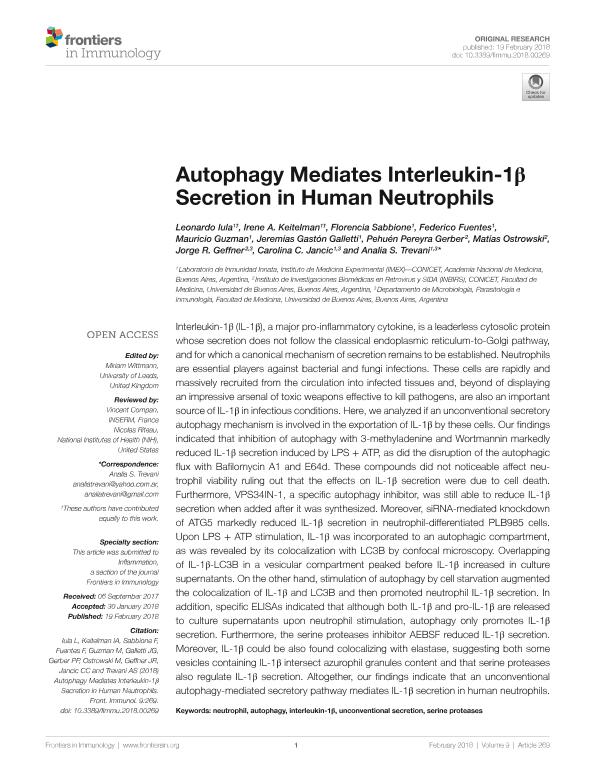Artículo
Autophagy mediates Interleukin-1beta secretion in human neutrophils
Iula, Leonardo Jairo ; Keitelman, Irene Angélica
; Keitelman, Irene Angélica ; Sabbione, Florencia
; Sabbione, Florencia ; Fuentes, Federico
; Fuentes, Federico ; Guzmán Fonseca, Oscar Mauricio
; Guzmán Fonseca, Oscar Mauricio ; Galletti, Jeremías Gastón
; Galletti, Jeremías Gastón ; Pereyra Gerber, Federico Pehuén
; Pereyra Gerber, Federico Pehuén ; Ostrowski, Matias
; Ostrowski, Matias ; Geffner, Jorge Raúl
; Geffner, Jorge Raúl ; Jancic, Carolina Cristina
; Jancic, Carolina Cristina ; Trevani, Analía Silvina
; Trevani, Analía Silvina
 ; Keitelman, Irene Angélica
; Keitelman, Irene Angélica ; Sabbione, Florencia
; Sabbione, Florencia ; Fuentes, Federico
; Fuentes, Federico ; Guzmán Fonseca, Oscar Mauricio
; Guzmán Fonseca, Oscar Mauricio ; Galletti, Jeremías Gastón
; Galletti, Jeremías Gastón ; Pereyra Gerber, Federico Pehuén
; Pereyra Gerber, Federico Pehuén ; Ostrowski, Matias
; Ostrowski, Matias ; Geffner, Jorge Raúl
; Geffner, Jorge Raúl ; Jancic, Carolina Cristina
; Jancic, Carolina Cristina ; Trevani, Analía Silvina
; Trevani, Analía Silvina
Fecha de publicación:
02/2018
Editorial:
Frontiers Media S.A.
Revista:
Frontiers in Inmunology
ISSN:
1664-3224
Idioma:
Inglés
Tipo de recurso:
Artículo publicado
Clasificación temática:
Resumen
Interleukin-1β (IL-1β), a major proinflammatory cytokine, is a leaderless cytosolic protein whose secretion does not follow the classical endoplasmic reticulum-to-Golgi pathway, and for which a canonical mechanism of secretion remains to be established. Neutrophils are essential players against bacterial and fungi infections. These cells are rapidly and massively recruited from the circulation into infected tissues and beyond of displaying an impressive arsenal of toxic weapons effective to kill pathogens, are also an important source of IL-1β in infectious conditions. Here, we analyzed if an unconventional secretory autophagy mechanism is involved in the exportation of IL-1β by these cells. Our findings indicated that inhibition of autophagy with 3-methyladenine (3-MA) and Wortmannin markedly reduced IL-1β secretion induced by LPS+ATP, as did the disruption of the autophagic flux with Bafilomycin A1 and E64d. These compounds did not noticeable affect neutrophil viability ruling out that the effects on IL-1β secretion were due to cell death. Furthermore, VPS34IN-1, a specific autophagy inhibitor, was still able to reduce IL-1beta secretion when added after it was synthesized. Moreover, siRNA-mediated knockdown of ATG5 markedly reduced IL-1β secretion in neutrophil-differentiated PLB985 cells. Upon LPS+ATP stimulation, IL-1β was incorporated to an autophagic compartment, as was revealed by its colocalization with LC3B by confocal microscopy. Overlapping of IL-1β-LC3B in a vesicular compartment peaked before IL-1β increased in culture supernatants. On the other hand, stimulation of autophagy by cell starvation augmented the colocalization of IL-1β and LC3B and then promoted neutrophil IL-1β secretion. In addition, specific ELISAs indicated that although both IL-1β and pro-IL-1β are released to culture supernatants upon neutrophil stimulation, autophagy only promotes IL-1β secretion. Furthermore, the serine proteases inhibitor AEBSF reduced IL-1β secretion. Moreover, IL-1β could be also found colocalizing with elastase, suggesting both some vesicles containing IL-1β intersect azurophil granules content and that serine proteases also regulate IL-1β secretion. Altogether, our findings indicate that an unconventional autophagy-mediated secretory pathway mediates IL-1β secretion in human neutrophils.
Palabras clave:
AUTOPHAGY
,
INTERLEUKIN-1BETA
,
NEUTROPHILS
,
INFLAMMATION
Archivos asociados
Licencia
Identificadores
Colecciones
Articulos(IMEX)
Articulos de INST.DE MEDICINA EXPERIMENTAL
Articulos de INST.DE MEDICINA EXPERIMENTAL
Articulos(INBIRS)
Articulos de INSTITUTO DE INVESTIGACIONES BIOMEDICAS EN RETROVIRUS Y SIDA
Articulos de INSTITUTO DE INVESTIGACIONES BIOMEDICAS EN RETROVIRUS Y SIDA
Citación
Iula, Leonardo Jairo; Keitelman, Irene Angélica; Sabbione, Florencia; Fuentes, Federico; Guzmán Fonseca, Oscar Mauricio; et al.; Autophagy mediates Interleukin-1beta secretion in human neutrophils; Frontiers Media S.A.; Frontiers in Inmunology; 9; 2-2018; 1-14
Compartir
Altmétricas



